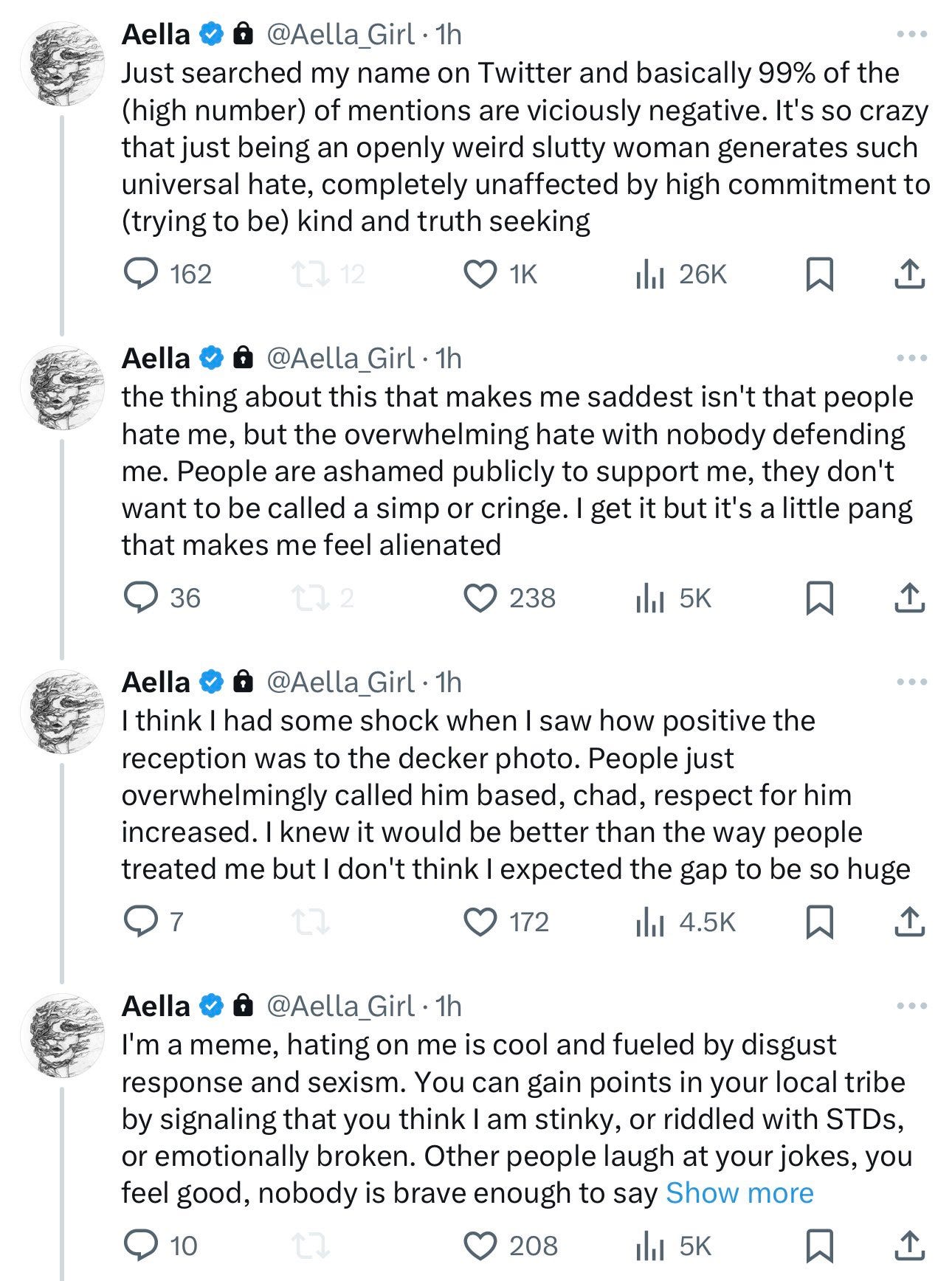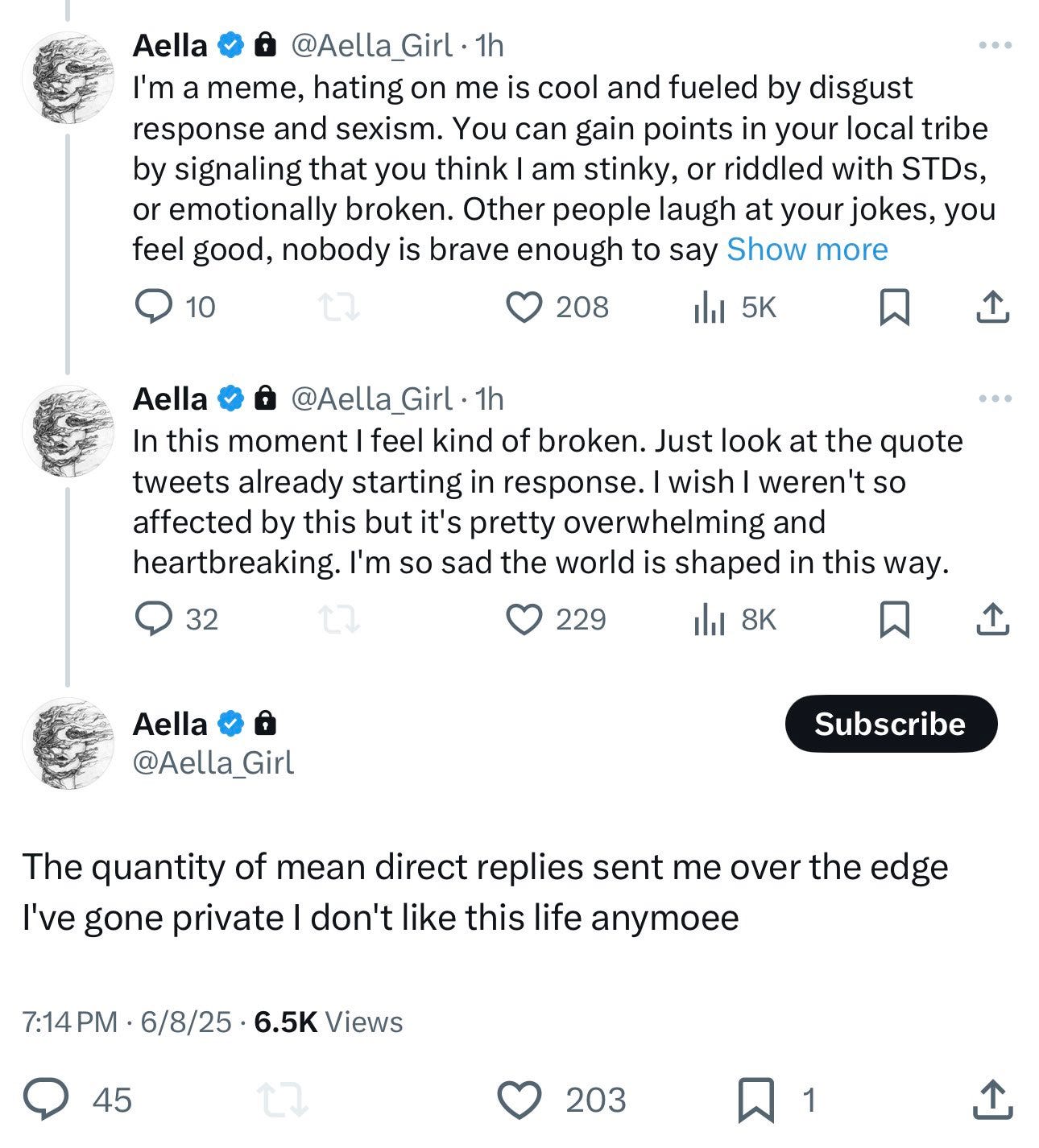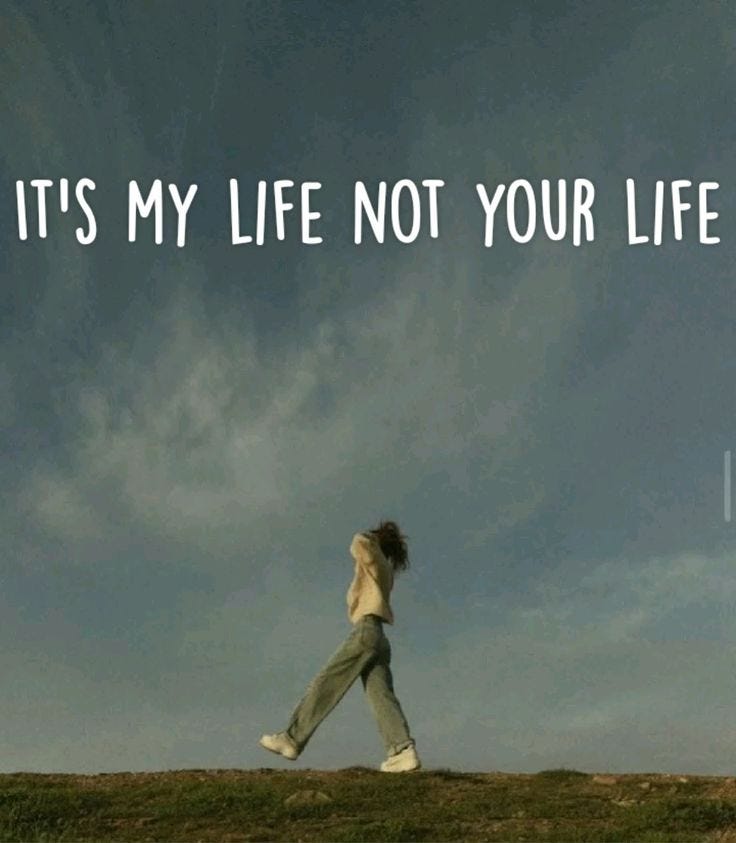Editor’s Note: A prior version of this article contained a paragraph at the end from another author, which I was using for my notes. The claims in that paragraph were much harsher than I intended to put out, and I apologize for my oversight.
One of the core problems we have in the modern world, from my perspective, is that our compassion has become unmitigated - unmoored from all other virtues in destructive ways. Unfortunately while unlimited compassion sounds good on the surface, ultimately it can lead to horrible outcomes. Chesterton famously explained what happens when the virtues go mad:
The modern world is not evil; in some ways the modern world is far too good. It is full of wild and wasted virtues. When a religious scheme is shattered (as Christianity was shattered at the Reformation), it is not merely the vices that are let loose. The vices are, indeed, let loose, and they wander and do damage. But the virtues are let loose also; and the virtues wander more wildly, and the virtues do more terrible damage. The modern world is full of the old Christian virtues gone mad. The virtues have gone mad because they have been isolated from each other and are wandering alone. Thus some scientists care for truth; and their truth is pitiless. Thus some humanitarians only care for pity; and their pity (I am sorry to say) is often untruthful.
About a week ago, an internet drama blew up in my corner of twitter where a prominent online prostitute, Aella, stumbled upon a lot of vitriol directed her way, and decided to go private. This story seems to have died down, and I wanted to wait a bit to publish this in order not to continue the dogpile. I won’t recount the entire background of Aella’s little internet fiefdom, as that’s too long of a story to recount here. But the core can be found here:
To summarize, apparently she searched her name and saw a ton of vitriolic attacks and discussions around her online presence. She claims that the worst part is the "overwhelming hate with nobody defending me. People are ashamed publicly to support me, they don't want to be called a simp or cringe."
Long story short she basically said that she is heartbroken, is "so sad the world is shaped this way," and decided to quit twitter and go locked for the foreseeable future.
Now again, I don’t want to go too far into this story, or turn this post into a piece about how horribly degenerate the internet or modern culture has become. Instead I’d like to use this whole debacle as a way to understand the social mechanism of shame, and explore what the ideal use of shame might look like in a culture.
Problems of "Just Living my Life”
As a Christian, I always have some trepidation around judging people. I wrote an entire essay on the place of judgment in the Christian life. Yet as I explain in that article, judging (or perhaps discernment) is often necessary:
First off, there is a lot of data in the world. A LOT of data. At a guess, any second you exist in the world you're filtering hundreds of millions (probably more) distinct items of sense data. Particles of light, smells, sounds, physical sensations, your own thoughts, et cetera et cetera. Just to make sense of all of this data, you're constantly judging what information is salient, or relevant, to your life and your decisions.
However, I want to explore a bit of a different angle here - that of role models, and mimesis. Most folks understand that, to a certain degree, we look up to role models and ‘popular’ people in society, take our cues from them to some degree. In the last few decades though, more and more people have been reading thinkers like Rene Girard, and coming to the conclusion that mimicry, or mimesis, goes far deeper in the human psyche than just the basics. For instance, Duncan Reybern explains a bit of how this works:
To clarify what this means, it helps to distinguish between our natural appetites and our desires. We naturally want things like food, sustenance, warmth, shelter and safety. But this wanting is appetitive; it is rooted in our basic biological nature. This is to say, we don’t really need to be taught to address our biological needs. Even an infant knows when it is hungry or cold. But beyond this, we tend not to really know what is worth desiring. We need others to model desire for us.
In the modern world, our natural appetites are pretty dang close to being fully satisfied. So our appetites have taken center stage. And if our appetites are determined mostly by those with status, those who garner attention and who people instinctively follow, it’s important that we pay close attention to what kind of actions are granted status and/or attention in our culture.
Back to Aella. For some quick background she is an extremely successful prostitute, and has built up a huge presence on twitter as well as a cult following in rationalist/effective altruism spheres. She does data science “work” as well, mostly via surveys she runs on twitter. She is polyamorous, openly promoting and campaining for that lifestyle, as well as lots of drug use. I won’t go too far into the degeneracy here, but suffice to say she breaks the majority of sexual norms we’ve had for a long time, and does it with relish and in ways specifically designed to garner attention.
In an “ideal” liberal society, we would just let Aella do her thing, live her life, and let the chips fall where they may. It’s the marketplace of ideas, after all! As you saw in the beginning, Aella is getting her “just desserts” from her lifestyle, and sadly is not having a good time after a decade of being an online prostitute.
Problem is, the way our culture rewards these attention grabbing activities leads other people into foolish lifestyles, and causes irreperable harm.
One of the darker facts about the story of Aella is that she apparently encouraged her her two younger sisters to get into online sex work (one of them, by her own admission on twitter, was doing camgirl jobs before she turned 18.)
The obviously solution here, from my perspective, is shame. If we as a culture decide no, actually it’s not great for us to heap status/attention/money onto women who are selling sex for profit, we ideally prevent other young women from following the path of Aella, and then facing the harsh consequences of their actions past the age of 30, as Aella herself is now realizing.
Cruel to be Kind
Now saying we should shame prostitues is all well and good, but how does this square with Christian, or even just decent human, compassion?
Well, there’s a famous song out there about this…
The solution to this seeming conundrum is that sometimes, shaming can be kind. If you see a child doing something you know is going to have horrible consequences down the road, is it compassionate and kind to let them continue with no intervention? Of course not!
Scale this idea up to a whole culture, and I think that’s where shame can come in as a positive force. In the modern world we have become allergic to shame, which is frankly a fair reaction to the extremely harsh shaming of Puritans and other Protestant/Evangelical strains that dominated America early after the Revolution. Yet at a certain point, we must understand that endless compassion is self-defeating.
We see this all over the place in modern society. Just a few examples:
Giving drug addicts more and more funds to buy drugs
Telling young men to “just be themselves” when they ask why they aren’t attracting women
On the flip side, telling unnattractive women they “look great” and leaving them to wonder why they can’t find a partner
Telling someone they have a great business idea/product when in reality it’s probably going to flop
In these situations, the cruel but truthful response is the correct response. It may seem difficult and harsh in the moment to tell people that they are ugly, or that their business is going to fail, but in the long run that’s the compassionate thing to do.
Unfortunately most people in the modern world opt for the short-term, “nice” option where you basically just ensure people they are great, and let them suffer the consequences. Given that we are so atomized and hypermobile, this shift makes sense. If you generally don’t think you’ll still have the same friendships or relationships over years or decades, you probably care less about the long term consequences for someone else’s actions. You prioritize short term comfort in the relationship, over actually helping the other person improve their lives.
All this being said, shame is still an extremely harsh instrument. As I’m sure Aella found searching her name, there are hordes and hordes of people out there willing to be extremely cruel, but without goodness in their hearts. Most of these people don’t actually shame women like her for any higher purpose, they just do it because it feels good, and lets them release their anger or judgment. That sort of shaming is to be avoided too, if possible.
We don’t want to overcorrect here, and go back to a Puritanical society where someone can be jailed just for saying a curse word. However, I’m convinced that at the current moment our culture uses shame too infrequently. I certainly don’t have an answer as to where exactly the balance is though, or how we can shift society towards a better place with regards to shame.
I simply wonder if it’s possible for us to shame others, while keeping love in our hearts?









The thing about shaming Aella for her actions is that shame is probably the very thing that lead her to where she is now, having grown up in a Conservative Protestant Christian household.
Her whole project is to reduce the shame we feel around sex, and while her project is sinful, it is rooted in trauma. Like Mark said she’s a “lost sister”, and I think an argument against Aella should be focused on conveying the fruits of the sin that she has unintentionally sowed as opposed to shaming her for her actions.
While shame is a very useful cultural reinforcement tool, it works best in collective societies (Western society is guilt-based, Eastern society is shame-based), hence Japan’s emphasis on shame and dishonoring; their culture is so coherent that when one does a culturally dishonorably thing, the collective psyche almost unconsciously rejects them to re-affirm the social norm.
I find it difficult to use shame-based tactics in a highly individualist and Western culture that has been fragmented for ages. While I agree that her behavior is shameful, I think we would all agree because our sub-culture is Christianity.
So if you are speaking to Christians, this article resonates, but who is your audience? Are you writing to Christians who are already in on the fundamental claims, or are you writing to convey a fundamental fault to anybody?
To do so I think would require additional length that extrapolates on the mechanisms of shame, how we have evidentially lost it in lieu of Aella’s work, and how we can foster healthy shame again in a way that re-frames it as a temporary falling from grace that can be mended as opposed to complete social ostrasization.
Very interesting. I would love to see a Christian tell their female friend counterparts that they’re fat and not very pretty in response when they just spent an hour getting ready trying to look their very best. Any Atheist overhearing would surely become a born again follower. And please tell me how to respond to my best friend when they ask how to act on a first date??? Regardless, your examples go from enabling drug users to petty social responses? If you’re going to be the next Thomas Aquinas step your game up. Your article is counterintuitive to many basic Christian philosophies and really needs a re-evaluation, just showing love a-la the fat girl that can’t find a date. Do you honestly think Jesus Christ had limited compassion and negatively evaluated Mary Magdalene into becoming a follower?